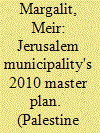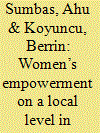|
|
|
Sort Order |
|
|
|
Items / Page
|
|
|
|
|
|
|
| Srl | Item |
| 1 |
ID:
182477


|
|
|
|
|
| Summary/Abstract |
The objective of the study was to capture the challenges that are faced by young informal traders in Bindura town, Zimbabwe. The study was motivated by the lack of attention to the challenges faced by young informal traders by the governing authorities at local and national level. We believe our study extends the understanding of the challenges faced by young informal traders, drawing on their everyday experiences and the navigation of the complex challenges they face. Deploying a qualitative research approach with in-depth interviews, focus group discussion and documentary analysis as data generation tools, the study found that young informal traders face several challenges that include lack of capital and harassment from municipal authorities as well as lack of mentoring and competition from established traders. Thus, the study established and concluded that within this difficult environment, young entrepreneurs employ different survival strategies such as raising capital from friends and relatives, relying on multifarious mentoring and coaching programmes from various sources. The paper recommends that government and private sector take up responsibility in nurturing these young entrepreneurs.
|
|
|
|
|
|
|
|
|
|
|
|
|
|
|
|
| 2 |
ID:
111383


|
|
|
|
|
| Publication |
2012.
|
| Summary/Abstract |
This paper uses a series of interviews to investigate how municipal planners in three Canadian provinces (Nova Scotia, Quebec, and Ontario) influence setbacks that regulate appropriate locations for wind turbines. Setbacks are provisions in local land use policies that dictate required separation distances between wind turbines and other land uses. Results of the study indicate that planners are not using a consistent method to ascertain appropriate distances and are often constrained by a lack of experience, resources, and expertise. These findings have important implications for wind energy regulation. Setbacks are intended to reasonably protect the public from the impacts of wind turbines, while allowing for some development. Municipalities in Canada may be best placed to consider local impacts of wind power, but the challenges identified raise concerns about potential arbitrariness. Setbacks that are unjustifiably high can unnecessarily close off territory and limit the ability to reach renewable energy targets. Taking regulatory power away from municipalities, as has happened in Ontario, can facilitate achievement of provincial targets, but may also increase opposition to projects at the local level.
|
|
|
|
|
|
|
|
|
|
|
|
|
|
|
|
| 3 |
ID:
125551


|
|
|
|
|
| Publication |
2013.
|
| Summary/Abstract |
Climate change is the issue of the century and, according to Agenda 21, local actions are essential to impact global mitigation of greenhouse gases (GHG) emissions ("think globally, act locally"). However, in order to plan and implement effective, sustainable actions, local authorities need detailed information on their GHG emissions and their sources. This paper presents the work that led to the development of a GIS-based tool for local GHG accounting, which provides data for local decision-makers in an innovative manner different from traditional GHG inventories. The original aspects of the study are the geo-referencing of all results and the possibility of calculating all emissions (carbon sources) and removals (carbon sinks) with input data of different accuracy.
|
|
|
|
|
|
|
|
|
|
|
|
|
|
|
|
| 4 |
ID:
101456


|
|
|
| 5 |
ID:
086272


|
|
|
|
|
| Publication |
2008.
|
| Summary/Abstract |
We now begin our press conference. We are now 962 days away from the opening ceremany of the Beijing Olympic games. It was agreed that we would provide information, by stages, about the construction of Beijing Olympic games projects, and we have this opportunity today to tell you what is happening.
|
|
|
|
|
|
|
|
|
|
|
|
|
|
|
|
| 6 |
ID:
149876


|
|
|
|
|
| Summary/Abstract |
Despite evidence that a rising number of municipalities in Germany are striving for energy self-sufficiency, there is little understanding of the driving factors behind this development. We investigate economic, ecological, social and energy system related factors that drive municipalities to strive for energy self-sufficiency with a focus on electricity supply. The empirical data for this study is based on insights generated through expert interviews (N =19) with mayors, energy experts and scientists as well as a quantitative study among mayors and energy officers (N =109) of German municipalities. Results show that environmental awareness, tax revenues and greater independence from private utilities are positively related to the mayors’ attitude towards the realization of energy self-sufficiency. Furthermore, citizens, the political environment, the mayor's political power, and his/her financial resources are relevant factors for a municipality striving for energy self-sufficiency. Policymakers need to decide whether or not to support mayors in this development. For suitable policy interventions, the results suggest the importance of an integrated approach that considers a combination of identified factors. Finally, we propose a morphological box to structure different aspects of energy self-sufficiency and categorize the present study.
|
|
|
|
|
|
|
|
|
|
|
|
|
|
|
|
| 7 |
ID:
169040


|
|
|
|
|
| Summary/Abstract |
Moving from the assumption that local governments are significant stakeholders of women’s empowerment policies, this article aims to examine the struggle against violence against women (VAW) at the local level through gender-sensitive policies employed by female mayors from a gender perspective and how these can be utilized as collective transformative resources for women’s empowerment. Based on a field-study, the contention of this article is that gender budgeting, gender-sensitive collective-labor contracts, and women’s support centers are institutional resources for the transformation of the municipal-budget, for attitude transformation in male employees, and for sustainable empowerment policies in the struggle against VAW in municipalities in Turkey. This article, stressing the link between the struggle against VAW and women’s empowerment, reveals the significance of institutionalization of gender-sensitive policies and the struggle at local level as two prominent factors taken to be into consideration in women’s empowerment.
|
|
|
|
|
|
|
|
|
|
|
|
|
|
|
|
|
|
|
|
|